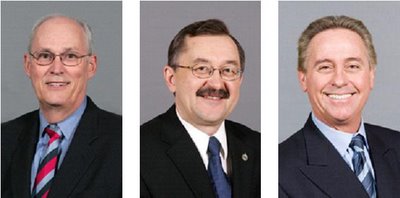Saskatchewan's Conservative MPs Embarrass Province
MPs vote party lines on same-sex
Lana Haight
The StarPhoenix
Friday, December 08, 2006
Saskatchewan MPs sided with their party lines in a vote to re-open the samesex marriage debate.
The province's 12 Conservative members voted in favour of the motion "to call on government to introduce legislation to restore the traditional definition of marriage without affecting civil unions and while respecting existing same-sex marriages." The motion was defeated with the support of
"To cherry-pick and roll back (rights) is a very slippery slope," said Gary Merasty, Liberal MP for Desnethe-Missinippi- Churchill River.
The Canadian Charter of Rights and Freedoms is designed to protect the rights of minorities, people with disabilities and women and ensures individuals can advance their rights through the courts, says Merasty. With his constituency split on the definition of marriage, Merasty decided to vote according to his own convictions.
Saskatoon-Humboldt MP Brad Trost says his vote in favour of re-opening the debate reflects his personal view, but also that of the majority of his constituents.
While some city neighbourhoods favour the new defi nition of marriage passed by Parliament in June 2005, other areas are decidedly against it, according to Trost's polling of several thousand households a couple of years ago.
"I believe in the traditional definition of marriage, no ifs, ands, buts, hesitations or equivocations," said Trost.
While Merasty hopes Thursday's vote signals the end to the same-sex debate, Trost expects the issue will be raised down the road when the implications of the vote become apparent.
He's concerned religious leaders and teachers will eventually be prevented from expressing their views on same-sex marriage.
lhaight@sp.canwest.com
©The StarPhoenix (
Minority rights ugly subtext in same-sex debate
Dec. 8, 2006. 01:00 AM
CHANTAL HEBERT
With Charter rights in the balance this week, the Prime Minister and the brand new leader of the official opposition took the easy way out.
Stephen Harper and Stéphane Dion both got themselves off the hook of the same-sex marriage issue with minimal political fallout yesterday. But neither man can claim to have taken the high road to get there.
The decisive defeat of a Conservative motion to reopen the debate on the legal definition of civil marriage — 175 to 123 — should bring an end to parliamentary efforts to turn the clock back on the marriage rights of same-sex couples.
If the fate of other morally divisive issues such as abortion and the death penalty is any indication, the outcome of yesterday's vote is unlikely to be reversed or even revisited by another Parliament.
That has to be a relief for Dion. To say that the Liberal party has consistently not practised what it preaches over the lengthy course of the same-sex marriage saga is an understatement.
Under Dion's two predecessors, a federal party that takes pride of ownership of the Charter of Rights and Freedoms has treated it like a pull-down menu, allowing its MPs to pick and choose where they stood on gay rights.
Now, history will record that on the first occasion when Dion was called upon to lead his party in a major vote, he had to adjust his principles to realpolitik and use the fig leaf of an argument to cover up his embarrassment.
Over the course of his leadership campaign, Dion had argued that the Liberal approach of allowing rights to be subject to free votes was unacceptable.
But faced this week with a choice between backing off and enduring the first internal crisis of his short leadership tenure, Dion opted to once again leave his members free to choose, explaining that a motion did not require the same dose of party discipline as a full-fledged piece of legislation.
Yesterday, a dozen Liberals bucked their leader's wishes. But that number would have been higher if the Commons had been seized with a bill rather than a resolution.
Not that the government had much of a legislative road map to follow in the unlikely event that it won the vote.
This week, Harper led the House of Commons on a dubious road to a legal nowhere.
Short of breaking his commitment not to use the notwithstanding clause to bar same-sex couples from obtaining civil marriages for five years, there was no way the Prime Minister could have introduced a constitutionally bulletproof law to have Canada revert to the former man/woman definition of the institution.
At the very least, the government would have had a lengthy legal battle on its hands, one most experts expected it to lose eventually. The plan to offer gays the fallback option of civil unions had already been described by some courts as a breach of the Charter rights of same-sex couples.
Besides, civil unions fall under the jurisdiction of the provinces. They are outside the legal purview of the federal government; the Prime Minister does not have the power to offer them as a substitute for civil marriages.
Still, Harper has earned a place in the history books for his efforts this week.
The bottom line in the latest instalment of this debate was not whether the federal government could end same-sex marriage without having to shelter a ban on them from the Charter. Nor was it whether the notwithstanding clause was a legitimate recourse for governments to use to have the last word on court decisions.
With same-sex marriage on the books since 2005, the debate had moved on to a more fundamental terrain: This week, Harper became the first post-war Prime Minister to ask the Commons to consider taking away the rights of a Canadian minority.
That he failed to garner sufficient support to press on with the plan does not mitigate the fact that he was willing to ask.
Let it also be noted that the vast majority of Conservative MPs, along with a happy dozen of their Liberal colleagues, were willing to wade in what is a much greater moral quagmire than the notion that gay and lesbian Canadians are entitled to enjoy equal access to the civil institutions of their country.
Chantal Hébert's national affairs column appears
Monday, Wednesday and Friday. chebert@thestar.ca.
Using religion to spread hate is repugnant
October 9, 2006
A black man and a white woman stand before a justice of the peace, eager to exchange their wedding vows.
But as they look lovingly into each other's eyes, the justice of the peace refuses to proceed — because he disapproves of interracial marriage.
This sort of discrimination would be repugnant to most Canadians. It's also not allowed in
Last year, Parliament passed legislation confirming the right of same-sex couples to be married by a JP, so they enjoy the same legal rights to marry as an interracial couple.
Stephen Harper wants to change this. He's apparently ordered legislation to be prepared that would, among other things, allow a JP to refuse to marry same-sex couples. In other words, the legislation would permit JPs to discriminate against same-sex couples in a way that they are not allowed to discriminate against interracial couples.
It should be noted that Canadian law already protects religious groups from being compelled to marry same-sex couples. But, according to a report in The Globe and Mail last week, Harper's new law is also expected to deal with some remaining areas of uncertainty, such as “the rights of individuals to publicly criticize homosexual behaviour, to take out advertisements that quote scripture demanding that homosexuals be put to death ...”
That homosexuals be put to death!
Hard as it is to believe, Canadian law currently provides not a whit of protection for those who hate gays so much they might want to take out an ad quoting a scripture passage calling for gays to be killed.
It seems the Harper government wants to remedy this oversight.
This is astonishing. Imagine the reaction if the government were preparing a law to protect those quoting a passage advocating the death of Jews or the disabled.
The proposed Defence of Religions Act, which the government dismisses as speculation, would be brought forward only if the Conservatives lose a motion this fall to reopen the debate on same-sex marriage.
“All indications are that the motion, which would authorize the government to introduce legislation to repeal the same-sex marriage law passed by Parliament last year, will be defeated by a combination of opposition MPs supported by a few Conservatives,” the Globe reported.
That this new law is even being considered points to the influence the Christian evangelical right has on Harper — an influence he has tried to conceal from the tolerant Canadian public.
Behind the scenes, however, Harper has worked tirelessly to build a coalition of evangelicals, Catholics and conservative Jews, as award-winning journalist Marci McDonald documents in the cover story of the current issue of the Walrus magazine.
Last spring, when the Prime Minister was too busy to meet Premier Dalton McGuinty, McDonald notes that “Harper made time for dozens of faith groups, including a five-woman delegation from the Catholic Women's League which hadn't managed to snare a sit-down with any prime minister in 24 years.”
The religious right may well be ecstatic. But my guess is that most Canadians would recoil at the notion of special protections for people expressing hatred — even calling for murder — no matter whether they present these views in the guise of “religion.”
Originally published by The Toronto Star Linda McQuaig's column usually appears every Monday.





0 Comments:
Post a Comment
<< Home